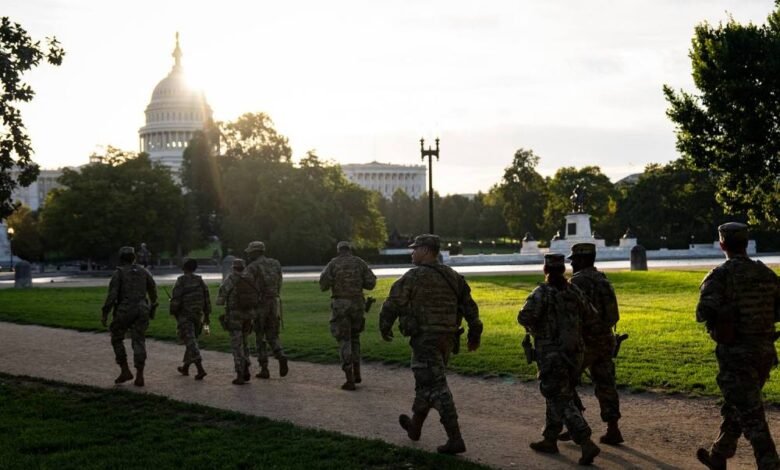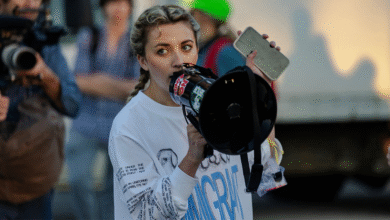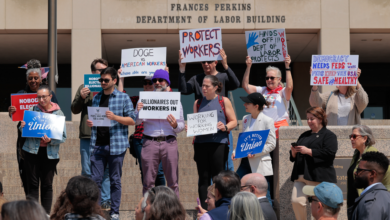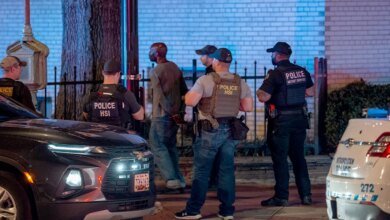Diplomacy, Defense, and National Security Impacts

Nearly a month into the U.S. federal government shutdown, foreign policy and national security needs are increasingly strained in subtle and not-so-subtle ways.
To date, the White House, State Department, Department of Defense, and other agencies have succeeded in minimizing negative impacts on U.S. defense and diplomatic operations. All active-duty military personnel are still required to report for duty, and many civilian workers who work in national security-related jobs are working without pay during the shutdown.
Nearly a month into the U.S. federal government shutdown, foreign policy and national security needs are increasingly strained in subtle and not-so-subtle ways.
To date, the White House, State Department, Department of Defense, and other agencies have succeeded in minimizing negative impacts on U.S. defense and diplomatic operations. All active-duty military personnel are still required to report for duty, and many civilian workers who work in national security-related jobs are working without pay during the shutdown.
But with another military payday scheduled for Oct. 31 looming, the Trump administration doesn’t appear to have another trifecta it can pull off as it did earlier in the month to reallocate $8 billion earmarked for defense research to pay service members instead.
The Department of Defense will use an anonymous $130 million donation, reportedly from billionaire Timothy Mellon — a longtime donor to President Donald Trump — to pay some troops. However, with the cost of paying all roughly $1.3 million active-duty personnel every two weeks nearly $7.5 billion, it is expected that many soldiers, airmen, sailors and Marines will remain without pay. This is in a field where a high percentage of military families are already food insecure and lack the savings to accommodate going without a paycheck.
Outside of the military, this closure has furloughed more civilians working in the defense and diplomatic sectors than previous closures. According to the agency-by-agency closure tracker compiled by New York Times62 percent, or 16,651 employees, of State Department employees have been furloughed. By comparison, 45% (334,904 workers) of the DoD civilian workforce have been furloughed.
“The thing that shocked me is how deeply these furloughs go into the national security infrastructure,” said Laura Holgate, a former U.S. ambassador to the International Atomic Energy Agency during the Biden administration who held senior national security positions across multiple administrations. “All of my experience in the past with lockdowns has relieved large parts of national security and foreign policy, because the world just doesn’t seem to stop,” she added.
The Department of Homeland Security, which is taking the lead on implementing the Trump administration’s top priority anti-immigration strategy, has a much smaller share of its workforce: just 5%, according to the DHS report. times track.
Meanwhile, dozens of House Democrats this week criticized the Energy Department’s decision to furlough about 80% of the National Nuclear Security Administration’s workforce. The Nuclear Security Agency is charged with overseeing the maintenance of America’s nuclear warhead stockpile. Despite the office’s clear national security role, a larger percentage of its workforce has been furloughed than the rest of the Department of Energy, which sent 59% of its officials home, according to the DOE report. times track.
“From maintaining and modernizing our nuclear weapons stockpile, to overseeing the Navy’s nuclear propulsion, and managing nuclear nonproliferation programs, the United States is safer because of the dedicated public servants who manage nuclear security,” said an Oct. 27 letter from 26 Democratic lawmakers sent to the Energy Secretary. “These federal employees play a critical oversight role in ensuring that the work required to maintain nuclear security is done. … Undermining the agency’s workforce at such a difficult time for U.S. global leadership diminishes the credibility of our deterrence, emboldens our international adversaries, and makes the world a more dangerous place.”
An NNSA spokesman, who was not authorized to be quoted, said in an email that all of the office’s security personnel “remain on duty” and that “production operations are continuing at all NNSA laboratories, plants and sites.”
With many national security agencies without significant numbers of their workforce for nearly a month, it is inevitable that many routine actions will not be implemented, and some projects will fall behind schedule. But obtaining details about which unclassified agency actions have been reduced or frozen is difficult.
One line of public transparency, congressional oversight that fell largely to Democrats during the second Trump administration, has been significantly scaled back, particularly by the State Department. More than 90 percent of the State Department’s Office of Legislative Affairs remains on leave, Senator Jeanne Shaheen, the top Democrat on the Foreign Relations Committee, said at a committee hearing last week.
The State Department said it is continuing important consular and diplomatic activities, including supporting official travel by Trump and Secretary of State Marco Rubio this week to Malaysia, South Korea and Japan.
While “some domestic support” for consular operations has been suspended, other consular operations — including passport and visa services as well as assistance to U.S. citizens abroad — are continuing, a State Department spokesperson, who was not authorized to be named, said via email. “Our work to represent the American people and advance the America-first foreign policy agenda has not stopped.”
“It’s just a return to the boiling frog analogy that seems to be on everyone’s lips these days,” Holgate said. “The less capable the United States government is, the less effective it becomes.”
US diplomats stationed abroad are particularly vulnerable to financial penalties resulting from the closure.
“Many Foreign Service families rely on one income,” said Nikki Geimer, director of communications and outreach for the American Foreign Service Association (AFSA), the union of American diplomats. “It can be difficult to find a job when you and your spouse are overseas. So, when one spouse is not getting paid, it’s a double challenge.”
The union has collected anonymous anecdotes from its members, who before the shutdown reportedly faced a climate of retaliation for expressing concerns about elements of the administration’s foreign policy.
“This is a huge waste of taxpayer dollars,” AFSA quoted an unnamed US diplomat as saying. “Hundreds of Foreign Service personnel receive a per diem to remain in D.C. for training, but do not receive said training. The majority will likely have to.” [move on to our assignments] Without the necessary training to do our job. We will then have to learn on the job, which slows our teams down and makes our external missions less effective.
Some agency officials are working in shifts throughout the shutdown, with one team reporting to the office for a week while the other is furloughed and then switches the following week. But this comes with paycheck complications during the extended shutdown.
“Some of us are rotating on leave,” AFSA quoted another official as saying. “This may mean that we are unable to claim the unemployment benefits allowed for those who have been fully furloughed.”
In other areas, the financial impacts of the lockdown decrease unevenly depending on where a person lives. For example, NATO ally Germany has stepped in to pay the October salaries of about 12,000 American civilian employees working at US military bases in the country at a cost of about 40 million euros (about $47 million), with Berlin expected to be paid when the lockdown ends. The US Army is unilaterally extending service contracts for soldiers who would otherwise leave the army for 45 days.
But one important area of soft diplomacy has not been jeopardized by the lockdown. Beijing’s ambassadors from the large, furry, obese and unlucky mammals stationed at the Smithsonian’s National Zoo in Washington, D.C., will be fed and cared for throughout the lockdown.
Don’t miss more hot News like this! Click here to discover the latest in Politics news!
2025-10-28 22:04:00




